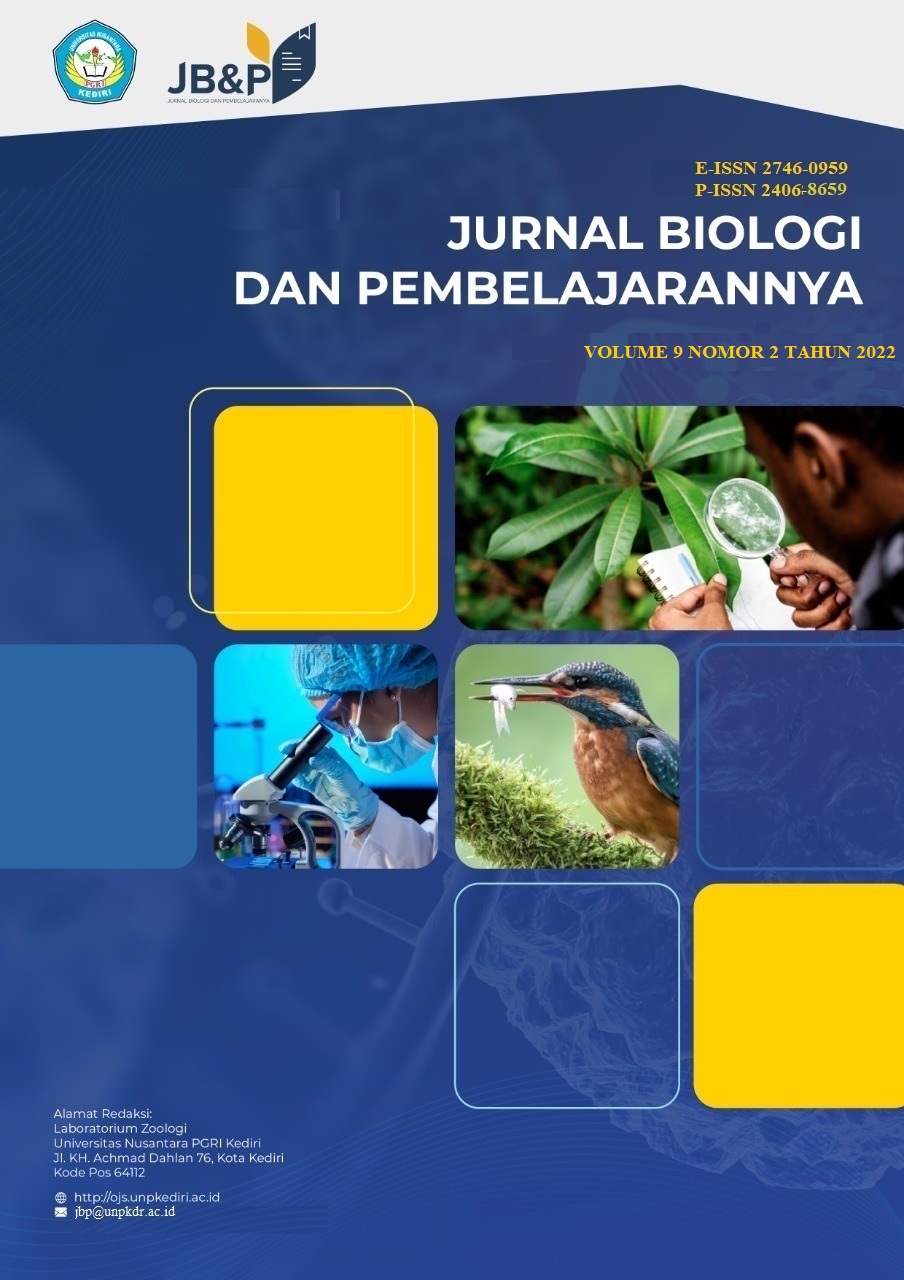Behavior of Sustainable Waste Management in Biology Teacher Candidates
DOI:
https://doi.org/10.29407/jbp.v9i2.17956Keywords:
sustainable waste management, behavior, studentsAbstract
Sustainable waste management behavior is an effort to overcome the problem of waste in the environment. Student-teacher candidates, especially prospective biology teachers, need to have positive attitudes about sustainable waste management because they will be role models for their students in the future. This study aims to describe the behavior of sustainable waste management in biology teacher candidates. The method used in this research is a survey. The respondents involved were 46 biology education students who had taken Basic Ecology courses. Data was collected through survey questionnaires with a Likert scale and analyzed descriptively. The results showed the behavior of sustainable waste management in prospective biology teacher students at KH. A. Wahab Hasbullah University is included in the good category. This is supported by the results of a self-assessment regarding the threats posed by waste and efforts to overcome them, which are also included in the good category. Sustainable waste management behavior and self-assessment influence each other.
References
Abdulghaffar, N. A., & Williams, I. D. (2021). Development of sustainable waste management in higher education institutions. AIMS Environmental Sciences, 8(3), 238–254. https://doi.org/10.3934/environsci.2021016
Adlin. (2021). Waste Management System in Pekanbaru City: City Government Capability, Issues, and Policy Alternatives. Jurnal Bina Praja, 13(3), 395–406. https://doi.org/10.21787/jbp.13.2021.395-406
Aliman, M., Budijanto, Sumarmi, Astina, I. K., & Arif, M. (2020). Challenges to anticipate climate change : An environmental awareness survey of High School Students in Indonesia in waste management. Eco. Env. & Cons, 26(2), 886–892.
Budihardjo, M. A., Humaira, N. G., Putri, S. A., Ramadan, B. S., Syafrudin, & Yohana, E. (2021). Sustainable Solid Waste Management Strategies for Higher Education Institutions: Diponegoro University, Indonesia Case Study. Sustainability, 13(13242), 1–15. https://doi.org/10.3390/su132313242
Dung, M. D., Mankilik, M., & Ozoji, B. E. (2017). Assessment of College Students’ Knowledge and Attitudes Toward Solid Waste Management in North Central Zone of Nigeria. Science Education International, 28(2), 141–146.
Hamzah, A., & Susanti, L. (2020). Metode Penelitian Kuantitatif (1st ed.). Literasi Nusantara.
Janmaimool, P. (2017). Application of Protection Motivation Theory to Investigate Sustainable Waste Management Behaviors. Sustainability, 9(1079), 1–16. https://doi.org/10.3390/su9071079
Jannah, A. M., Moeksin, R., Cundari, L., Yandriani, & Rendana, M. (2021). Pengelolaan Sampah Organik Skala Rumah Tangga Menggunakan Metode Komposting di Desa Sakatiga, Kecamatan Inderalaya, Kabupaten Ogan Ilir. Seminar Nasional AVoER XIII 2021, 487–491.
Kartini, K. S., & Putra, I. N. T. A. (2020). Respon Siswa terhadap Pengembangan Media Pembelajaran Interaktif Berbasis Android. Jurnal Pendidikan Kimia Indonesia, 4(1), 12–19. https://doi.org/10.23887/jpk.v4i1.24981
Lahiri, A., Jha, S. S., Chakraborty, A., Dobe, M., & Dey, A. (2021). Role of Threat and Coping Appraisal in Protection Motivation for Adoption of Preventive Behavior During COVID-19 Pandemic. Front. Public Health, 9(678566), 1–13. https://doi.org/10.3389/fpubh.2021.678566
Laiphrakpam, M., Aroonsrimorakot, S., & Shanker, A. R. (2019). Environmental education and awareness among students in India, Japan and Thailand for sustainable development. Journal of Thai Interdisciplinary Research, 14(2), 48–53. https://doi.org/10.14456/jtir.2019.18
Liang, S., Fang, W., Yeh, S., Liu, S., Tsai, H.-M., Chou, J.-Y., & Ng, E. (2018). A Nationwide Survey Evaluating the Environmental Literacy of Undergraduate Students in Taiwan. Sustainability, 10(1730), 1–21. https://doi.org/10.3390/su10061730
Nakholi, B. N. (2021). Factors Enhancing Sustainable Waste Management in Rusinga Schools. International Academic Journal of Arts and Humanities, 1(2), 286–299.
Owojori, O. M., Mulaudzi, R., & Edokpayi, J. N. (2022). Student’s Knowledge, Attitude, and Perception (KAP) to Solid Waste Management: A Survey towards a More Circular Economy from a Rural-Based Tertiary Institution in South Africa. Sustainability, 14(1310), 1–23. https://doi.org/10.3390/su14031310
Paradita, L. I. (2018). Pemilahan Sampah: Satu Tahap Menuju Masyarakat Mandiri dalam Pengelolaan Sampah. Jurnal Berdikari, 6(2), 184–194. https://doi.org/10.18196/bdr.6245
Tseng, M. L., Ardaniah, V., Bui, T.-D., Tseng, J.-W., Lim, M. K., & Ali, M. H. (2022). Sustainable waste management in the Indonesian medical and health-care industry: technological performance on environmental impacts and occupational safety. Management of Environmental Quality, 33(2), 549–569. https://doi.org/10.1108/MEQ-07-2021-0160
Yusuf, R., & Fajri, I. (2022). Differences in behavior, engagement and environmental knowledge on waste management for science and social students through the campus program. Heliyon, 8(e08912), 1–14. https://doi.org/10.1016/j.heliyon.2022.e08912
Downloads
Published
Issue
Section
License
Authors who publish with this journal agree to the following terms:
- Copyright on any article is retained by the author(s).
- The author grants the journal, right of first publication with the work simultaneously licensed under a Creative Commons Attribution License that allows others to share the work with an acknowledgment of the work’s authorship and initial publication in this journal.
- Authors are able to enter into separate, additional contractual arrangements for the non-exclusive distribution of the journal’s published version of the work (e.g., post it to an institutional repository or publish it in a book), with an acknowledgment of its initial publication in this journal.
- Authors are permitted and encouraged to post their work online (e.g., in institutional repositories or on their website) prior to and during the submission process, as it can lead to productive exchanges, as well as earlier and greater citation of published work.
- The article and any associated published material is distributed under the Creative Commons Attribution-ShareAlike 4.0 International License













